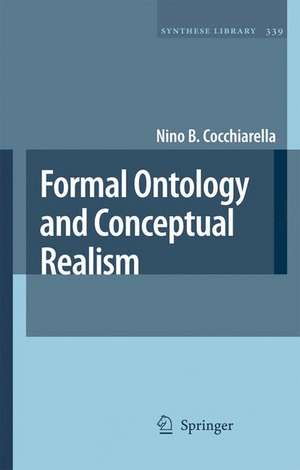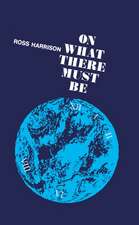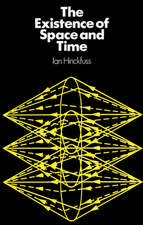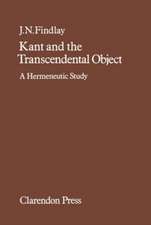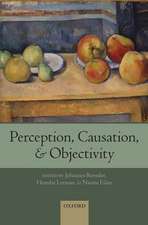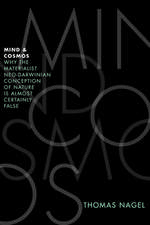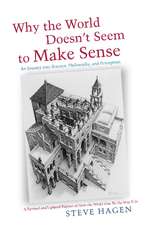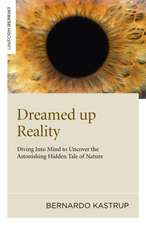Formal Ontology and Conceptual Realism: Synthese Library, cartea 339
Autor Nino B. Cocchiarellaen Limba Engleză Hardback – 20 sep 2007
| Toate formatele și edițiile | Preț | Express |
|---|---|---|
| Paperback (1) | 947.35 lei 43-57 zile | |
| SPRINGER NETHERLANDS – 25 noi 2010 | 947.35 lei 43-57 zile | |
| Hardback (1) | 953.35 lei 43-57 zile | |
| SPRINGER NETHERLANDS – 20 sep 2007 | 953.35 lei 43-57 zile |
Din seria Synthese Library
- 15%
 Preț: 638.43 lei
Preț: 638.43 lei - 18%
 Preț: 989.98 lei
Preț: 989.98 lei - 15%
 Preț: 596.69 lei
Preț: 596.69 lei - 18%
 Preț: 903.93 lei
Preț: 903.93 lei - 15%
 Preț: 586.88 lei
Preț: 586.88 lei - 15%
 Preț: 696.50 lei
Preț: 696.50 lei - 18%
 Preț: 892.90 lei
Preț: 892.90 lei - 15%
 Preț: 643.34 lei
Preț: 643.34 lei -
 Preț: 282.33 lei
Preț: 282.33 lei - 5%
 Preț: 372.19 lei
Preț: 372.19 lei -
 Preț: 443.10 lei
Preț: 443.10 lei - 15%
 Preț: 637.59 lei
Preț: 637.59 lei - 18%
 Preț: 958.88 lei
Preț: 958.88 lei - 15%
 Preț: 642.36 lei
Preț: 642.36 lei - 18%
 Preț: 1230.66 lei
Preț: 1230.66 lei - 15%
 Preț: 642.83 lei
Preț: 642.83 lei - 18%
 Preț: 1000.39 lei
Preț: 1000.39 lei -
 Preț: 389.70 lei
Preț: 389.70 lei - 15%
 Preț: 637.28 lei
Preț: 637.28 lei - 18%
 Preț: 952.26 lei
Preț: 952.26 lei - 18%
 Preț: 1231.32 lei
Preț: 1231.32 lei - 15%
 Preț: 645.96 lei
Preț: 645.96 lei -
 Preț: 395.85 lei
Preț: 395.85 lei -
 Preț: 400.47 lei
Preț: 400.47 lei - 18%
 Preț: 1225.48 lei
Preț: 1225.48 lei - 15%
 Preț: 638.89 lei
Preț: 638.89 lei - 18%
 Preț: 1232.09 lei
Preț: 1232.09 lei -
 Preț: 380.45 lei
Preț: 380.45 lei -
 Preț: 394.87 lei
Preț: 394.87 lei - 15%
 Preț: 640.37 lei
Preț: 640.37 lei - 15%
 Preț: 639.08 lei
Preț: 639.08 lei -
 Preț: 381.98 lei
Preț: 381.98 lei - 15%
 Preț: 643.00 lei
Preț: 643.00 lei - 15%
 Preț: 672.29 lei
Preț: 672.29 lei
Preț: 953.35 lei
Preț vechi: 1162.61 lei
-18% Nou
Puncte Express: 1430
Preț estimativ în valută:
182.43€ • 190.95$ • 151.83£
182.43€ • 190.95$ • 151.83£
Carte tipărită la comandă
Livrare economică 31 martie-14 aprilie
Preluare comenzi: 021 569.72.76
Specificații
ISBN-13: 9781402062032
ISBN-10: 1402062036
Pagini: 356
Ilustrații: XXIV, 332 p.
Dimensiuni: 155 x 235 x 21 mm
Greutate: 0.67 kg
Ediția:2007
Editura: SPRINGER NETHERLANDS
Colecția Springer
Seria Synthese Library
Locul publicării:Dordrecht, Netherlands
ISBN-10: 1402062036
Pagini: 356
Ilustrații: XXIV, 332 p.
Dimensiuni: 155 x 235 x 21 mm
Greutate: 0.67 kg
Ediția:2007
Editura: SPRINGER NETHERLANDS
Colecția Springer
Seria Synthese Library
Locul publicării:Dordrecht, Netherlands
Public țintă
ResearchCuprins
Formal Ontology.- Formal Ontology and Conceptual Realism.- Time, Being, and Existence.- Logical Necessity and Logical Atomism.- Formal Theories of Predication.- Formal Theories of Predication Part II.- Intensional Possible Worlds.- Conceptual Realism.- The Nexus of Predication.- Medieval Logic and Conceptual Realism.- On Geach Against General Reference.- Le?niewski’s Ontology.- Plurals and the Logic of Classes as Many.- The Logic of Natural Kinds.
Recenzii
“This book is a significant contribution to the field of formal ontology, and to analytical ontology in general - it presents an original and powerful systematic position with a host of important technical results.” Johanna Seibt, University of Aarhus, Denmark
Textul de pe ultima copertă
Theories about the ontological structure of the world have generally been described in informal, intuitive terms, and the arguments for and against them, including their consistency and adequacy as explanatory frameworks, have generally been given in even more informal terms. The goal of formal ontology is to correct for these deficiencies. By formally reconstructing an intuitive, informal ontological scheme as a formal ontology we can better determine the consistency and adequacy of that scheme; and then by comparing different reconstructed schemes with one another we can much better evaluate the arguments for and against them and come to a decision as to which system it is best to adopt.
Conceptual realism, which is defended here as the best system to adopt, contains both an intensional and a natural realism as well as an Aristotelian essentialism based on a logic of natural kinds.
"This book is a significant contribution to the field of formal ontology, and to analytical ontology in general - it presents an original and powerful systematic position with a host of important technical results." Johanna Seibt, University of Aarhus, Denmark
Conceptual realism, which is defended here as the best system to adopt, contains both an intensional and a natural realism as well as an Aristotelian essentialism based on a logic of natural kinds.
"This book is a significant contribution to the field of formal ontology, and to analytical ontology in general - it presents an original and powerful systematic position with a host of important technical results." Johanna Seibt, University of Aarhus, Denmark
Caracteristici
An account of the general features and methodology of formal ontology A formalized account and defense of conceptual realism A reconstruction and comparison of Frege’s and Russell’s versions of logical realism A reduction of Lesniewski’s logic of names to a conceptualist logic of names A logic of classes as many and its use in the semantics of plural reference and predication A formal account of Aristotelian essentialism in terms of a logic of natural kinds
